Coordinación
Una coordinación sólida puede evitar vacíos y duplicaciones en las respuestas humanitarias, así como garantizar que los PTM complementen otros tipos de asistencia. Sin embargo, el informe del «Estado Global de los Programas de Transferencias Monetarias» de la CALP Network muestra que la coordinación de la asistencia en efectivo es vista como débil y ad hoc, y que esto está teniendo graves repercusiones operativas.
Los donantes, las ONG y los líderes de los grupos de trabajo de transferencias monetarias (GTM) han pedido claridad sobre tres temas principales relacionados con la coordinación de la asistencia en efectivo:
- Quién debe ser responsable de asegurar una coordinación eficaz de la asistencia en efectivo;
- Cuál es la función y el mandato de los grupos de trabajo de transferencias monetarias, incluso en relación con las transferencias monetarias multipropósito;
- Cómo se debe dotar de recursos a la coordinación de asistencia en efectivo.
Tenemos que basarnos urgentemente en lo que funciona y proporcionar claridad a nivel mundial sobre las preguntas arriba mencionadas, adaptándonos a los diferentes contextos. Hace mucho tiempo que se deberían haber tomado decisiones claras basadas en necesidades operativas y no en la política de las agencias.
Prioridades actuales
El objetivo de la CALP Network es contribuir a seguir progresando en este tema en tres niveles: apoyar a los grupos de trabajo de transferencias monetarias a nivel regional; contribuir a soluciones prácticas para la coordinación de la asistencia en efectivo a nivel mundial; y convocar una discusión basada en la evidencia sobre temas clave, destacando puntos de decisión críticos y oportunidades de progreso.
Contenido destacado

Cash Coordination Tip Sheet
Guidelines and Tools
This tip sheet sets out established best practice, key guidance and resources for all aspects of cash coordination, intended as a clear, accessible and action-oriented guide for those engaged in coordination of cash and voucher assistance (CVA) at the field level.

Introducing the Cash Coordination Tip Sheet
Webinar
The CALP Network has developed a tipsheet setting out established best practice and key guidance and resources for all aspects of cash coordination, intended as a clear, accessible and action-oriented guide for those engaged in coordination of cash and voucher assistance at the field level.

Cash Coordination: A proposal from members in MENA
Blog Post
Earlier this year the CALP Network undertook regional consultations to explore options for cash coordination. This blog lays out recommendations from participants from the Middle East and North Africa who sketched out what cash coordination, and coordination more broadly, could look like in future to support a more effective, efficient and accountable response.
Últimos recursos

Good Practice Review 11: Cash transfer programming in emergencies
Guidelines and Tools
The GPR is intended for humanitarian practitioners who plan and implement emergency responses – both those who are already familiar with cash-based interventions and those who are not. It synthesises cash transfer guidelines, highlights lessons from evaluations and adds practical examples drawn from...

Evaluation Report Fresh Food Voucher – ACF Santa Cruz, Bolivia
Case Study
This report presents and discusses the results of a pilot study to deliver vouchers, which can be exchanged for fresh foods, to indigenous communities in rural areas of the Bolivian Chaco. This intervention is meant as an emergency measure as a result of the prolonged drought that had endangered the food...

Trading in Turbulent Times: Smallholder maize marketing in the Southern Highlands, Tanzania
Case Study
The short-run effects of the 2007/2008 global food crisis on semi-subsistence farmers’ well-being in low-income countries depends on whether they are net sellers or net buyers of the affected commodities. Realizing that farmers face volatile prices over the course of an agricultural year, this study...
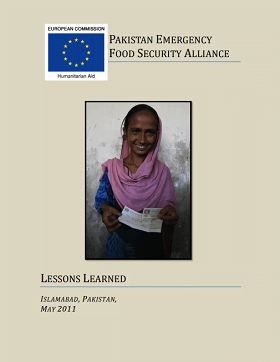
Pakistan Emergency Food Security Alliance: Lessons Learned
Report
In response to the unprecedented scale of flooding that affected Pakistan in July 2010, six INGOs – Save the Children, Oxfam GB, IRC, CARE, ACTED and Action Against Hunger / ACF International – formed the Pakistan Emergency Food Security Alliance (PEFSA). Working together in order to maximize the...
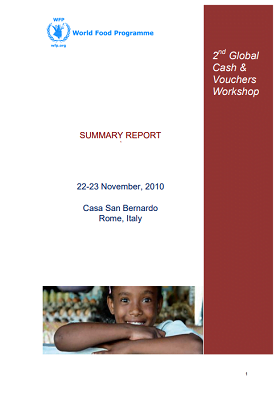
WFP 2nd Global Workshop on Cash and Vouchers
Report
Executive Summary The 2nd Global Cash and Vouchers Workshop in Rome 22-23 November 2010, was convened jointly by the Programme Division (ODX) and the Policy Planning and Strategy Division (OEDP), one year following the 1st Global Cash and Vouchers Workshop convened in Johannesburg 17-19 November 2009. The...
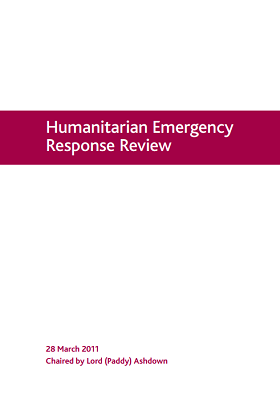
Humanitarian Emergency Response Review
Report
This independent review into how the UK (through DFID) responds to humanitarian emergencies, considers how the UK should best respond to overseas emergencies and the role the UK should play in the international humanitarian system. It looks at the potential future humanitarian challenges and the...

Local and Regional Procurement of Food Aid in Uganda: The Experience of Maize Traders
Report
Local and regional procurement (LRP), the purchase of foods for food assistance in or near an affected region, is growing in importance in the world of food assistance. Food aid has been traditionally “tied,” which is to say contingent on sourcing in donor countries. The political climate in...
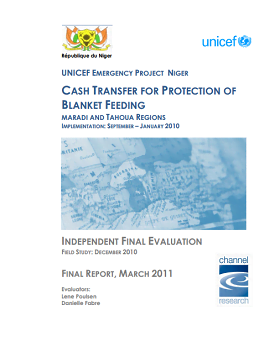
Cash Transfer for Protection of Blanket Feeding: Maradi and Tahoua regions
Report
The Project ‘Cash Transfer to Protect Blanket Feeding’ in Niger was launched by UNICEF in June 2010. The Project was a direct response to the growing evidence that blanket supplementary feeding rations distributed to children of 6 to 23 months of age in food insecure communities were consumed by older...

The CALP Network 4th Global Learning Event: Global innovations and lessons learned from response in South and South-East Asia (Final report)
Report
The 4th CALP Network Global Learning Event was held in Bangkok, Thailand on the 16th and 17th February 2011, hosted by the CALP Network in partnership with the International Federation of the Red Cross and Red Crescent Societies (IFRC). This inter-agency event was designed to present the latest thinking...
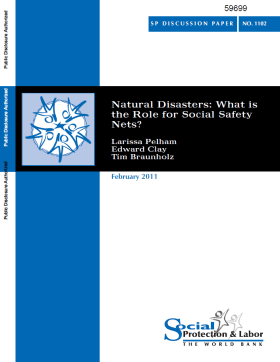
Natural Disasters: What is the role for social safety nets?
Policy paper
This paper makes the case for why safety nets are an important tool for managing the risk of natural hazards. The use of safety nets is advocated both ex ante, to prevent and mitigate the impact of natural disaster and ex post, to cope with the impacts of natural shocks. Firstly, the paper explores the...

The Livestock Emergency Guidelines and Standards (LEGS)
Guidelines and Tools
A presentation giving insight to LEGS, discussing: Aims of LEGS Rationale of LEGS Development of LEGS Objectives and approaches PRIM LEGS training programme. Taken from the Cash Learning Partnership Global Learning Event Bangkok, 16-17 February 2011.
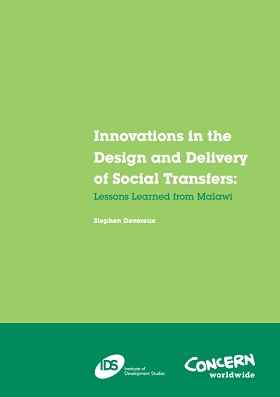
Innovations in the design and delivery of social transfers: Lessons learned from Malawi
Case Study
In 2005/6 and 2006/7, Concern Worldwide in Malawi designed and delivered two emergency social transfer programmes that were evaluated as innovative and effective, and have advanced thinking on best practice and what is feasible, both in emergency contexts and in the delivery of predictable (nonemergency)...

Nairobi Urban Social Protection Programme
Case Study
This case study of an Oxfam urban cash transfer programme in Kenya looks at how cash can be used as part of a national social protection programme to improve access to food of the most vulnerable households, at the same time as developing longer term food and income security initiatives. The report looks...
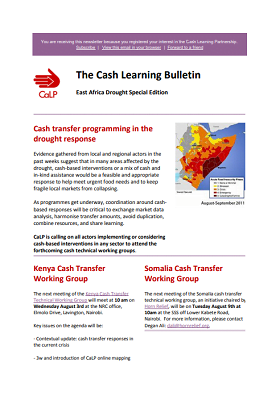
Cash Learning Bulletin: East Africa drought special edition
Report
A CALP Network bulletin with articles and information on: Cash transfer programming in the drought response Kenya Cash Transfer Working Group Somalia Cash Transfer Working Group Training on Cash Transfers in Emergencies and a list of appropriate links and resources.

Abogando por transferencias monetarias: guía rápida para la promoción de la programación de transferencias en efectivo
Guía y herramientas
Porque la programación de transferencias en efectivo (CTP) es todavía una forma relativamente nueva de la entrega de ayuda, los profesionales a menudo pueden encontrar que tienen que ser capaces de abogar por el uso de CTP, así como los miedos de las distintas audiencias. Esta guía tiene como objetivo...
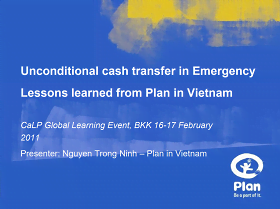
Unconditional cash transfer in Emergency Lessons learned from Plan in Vietnam
Presentation
A presentation from the the CALP Network Global Learning Event, BKK 16-17 February 2011. Topics covered include: Implementation process Findings after intervention Strengths and weaknesses Lessons learned Presenter: Nguyen Trong Ninh – Plan in Vietnam

Evaluation of Cash Relief Programme implemented by Horn Relief
Report
This evaluation of the Emergency Cash Relief Programme (ECRP) was conducted between the 10th -22nd of June 2004. The evaluation looked at the various issues of programme operation and management, including financial management, and used an overall performance-scoring matrix for this purpose. The overall...
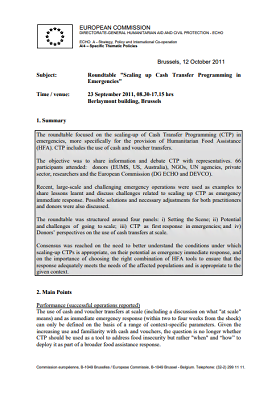
Report: ECHO Roundtable "Scaling Up Cash Transfer Programming in Emergencies"
Report
This 3-page report sums up the main points raised at the ECHO / WFP hosted roundtable on “Scaling Up Cash Transfer Programming in Emergencies”, 23 September 2011. The roundtable focused on the scaling-up of Cash Transfer Programming (CTP) in emergencies, more specifically for the provision of...
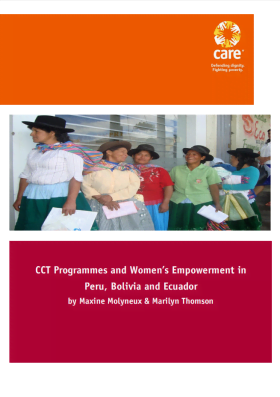
CCT Programmes and Women’s Empowerment in Peru, Bolivia and Ecuador
Report
Latin America’s efforts to alleviate poverty have resulted in reducing poverty in twelve countries, most strikingly in Mexico and Brazil. The adoption of Cash Transfer programmes in much of the region is credited with helping to bring this reduction about. These programmes are widely promoted as a cost...
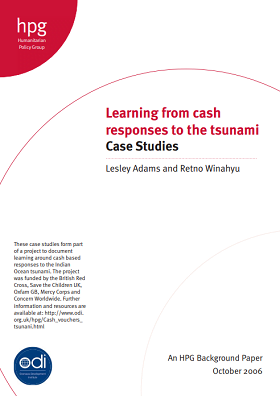
Learning from Cash Responses to the Tsunami: Case Studies
Case Study
These case studies form part of a project to document learning around cash based responses to the Indian Ocean tsunami. The project was funded by the British Red Cross, Save the Children UK, Oxfam GB, Mercy Corps and Concern Worldwide.